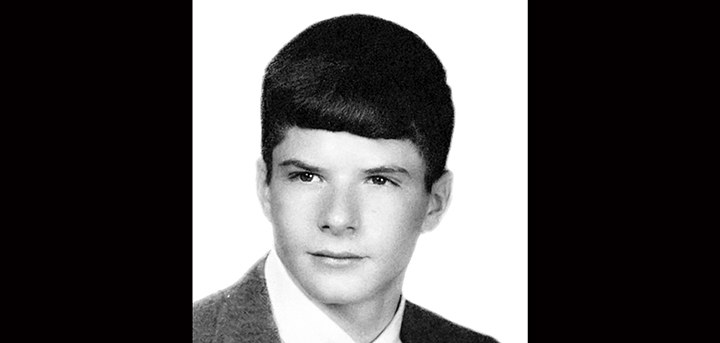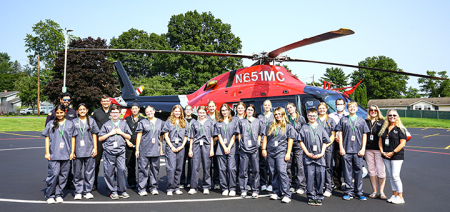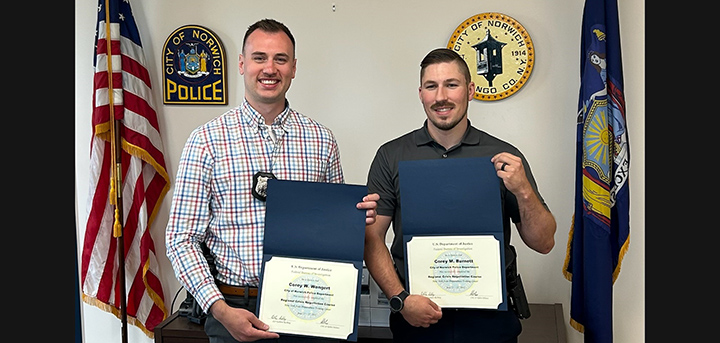NHS Sports Hall Of Fame: Franklin “Frank” Ault, Class Of 1966
Published:
March 18th, 2022
 Franklin “Frank” Ault (Submitted photo)
Franklin “Frank” Ault (Submitted photo)
Editor’s note: Today’s article on Frank Ault is the first in a series profiling the Norwich High School Sports Hall of Fame 2020 and 2021 inductees. A combined ceremony for each induction class is scheduled Saturday, May 14 at the Norwich High School Gymnasium at approximately 6:45 PM. A social hour begins at 4:30 p.m. with a buffet dinner at 5:30 p.m. Tickets are $20 per person for the social hour and buffet dinner, and are available for purchase at the Norwich YMCA or the Norwich High School athletics department. There is no charge to attend just the induction ceremony.
By Tom Rowe
Sun Sports Contributor
Back in 1972, a book was written about the short time on earth enjoyed by John F. Kennedy. Penned by two of his closest friends and advisors, Kenneth P. O’Donnell and David F. Powers, that literary work – “Johnny, We Hardly Knew Ye” – was not only concerned with his brief two-plus years as president, but his likewise abbreviated time of 46-and-change years on this planet. Kennedy’s presidential term spanned exactly 2 years and 306 days, while his life was snuffed out by an assassin just seven days shy of 46 ½ years.
In mirror-like fashion, Norwich High teammates and classmates could produce a similar journalistic enterprise pertaining to the short life of Franklin “Frank” Ault. Ault was a student-athlete at NHS for only two years, and his life tragically ended when he was electrocuted 32 days prior to his 50th birthday. However, he packed much into both of those abbreviated ventures, and what he achieved while wearing the Purple & White is why he is being honored as one of the newest members of the ninth annual Norwich High School Sports Hall of Fame class.
Although a three-sport letter winner, Ault’s choice of competition was of the singular kind as he competed in track and field, swimming and cross country. Unlike football, basketball or baseball there is no one to pick you up after a mistake or better yet to not even let one happen. An offensive line gives their quarterback protection to pass, fellow cagers set picks and box out in order to free up uncontested jump shots and free drives to the basket and the seven players behind a pitcher can make his stats all the better with a gold glove play.
“During the mid-’60s, Norwich was a member of the Iroquois League in all sports. I was a classmate and teammate of Frank during those days when we played against the likes of Frankfort, Herkimer, Ilion and, of course, our big rival Oneonta,” noted Joe Caravaglio, who ran track for two seasons with Ault.
“The first time I saw Frank I would not have guessed that he was an exceptional athlete, because he did not act or look the part. Easy going, he liked to have fun and kid around just like everyone else. He came across as a regular guy, more so than a track or swimming star. And, although he won most everything he competed in, I never saw him wearing varsity letters on a Purple Tornado jacket.”
Ault began his high school career in Norwich at the start of his junior year, after spending the first two years as a student at South Otselic Central School. Born in Atlanta, GA, Frank and his family arrived on the local scene in 1954 when his father, an employee of Norwich Eaton Pharmaceuticals, was transferred to Norwich. Seven years later, they moved to South Otselic when they purchased a beautiful mini-estate called “Broadlawn.” Although still residing in South Ot, Frank began riding with his father to work in Norwich at the start of the 1964-65 school year.
And, although he qualified for the cross country intersectionals that first fall, performed in a myriad of swimming events that winter and captured the Iroquois League championship in both the mile run and triple jump the following spring, we’re going to fast forward to his senior year, a season that saw him establish track and swimming records on an almost weekly basis.
Over the course of the first three track meets of the 1966 season, he set new standards in the 880, sprint medley relay, triple jump and came within an eyelash of adding a fourth in the 440. On April 27, while running the 880 for the first time, he broke Tom Drake’s two-year old mark of 2:05.6 with a time of 2:03.3. Three days later at the Section 3 “B” Relay Carnival, he teamed up with Harold Burton, Mike Robertson and Bob Raynor with a record-setting clocking of 3:44.6, six seconds better than the old mark. And, four days after that, in competition with Frankfort, he bettered his triple jump record of 41 feet; 7 inches with a leap of 41-10 ¼, and made his inaugural run in the 440 a memorable one with a 52.4 first-place clocking, only 1.4 seconds off Burton’s record of a year before.
Late in May, he was forced to sit out a meet with Herkimer because of a bad knee – an injury that would forebode things to come. Three days later, however, he won his second straight Iroquois League title in the triple jump with a new meet and school mark of 42-4 and placed second in the 880. The previous meet record of 42-1 ¼ in the triple jump had been established back in 1963.
But, Frank saved his best for last, for while competing in the Section 3 Class B Championships on his home turf, he put forth a leap for the ages with a triple jump of 44 feet; 4 inches to ice first place, and added another record-setting first-place time in the 880 with a new Norwich clocking of 1:58.4, 2.4 seconds faster than his previous best. Both of those efforts helped propel the Purple to their second consecutive Class B team title.
That triple jump, a precursor to Bob Beamon’s improbable long jump record of 29-8 at the 1968 Summer Olympics in Mexico City, stood the test of time. And it took 55 more springs before Ault’s leap was finally eclipsed. On May 7, 2021, Elijah Craddock rocketed to a leap of 47 feet; 1 ½ inches to break what still is the longest standing track and field record in school history.
“During the 1965 season, Frank almost exclusively ran the mile, but late that year our usual triple jumper, Joe Otto, went out with an injury,” recalled Caravaglio, who was an 880 competitor, himself. “One day, he was watching some field events and thought he might give jumping a try. He certainly did more than that, considering the record he set.
“That means younger athletes who are bigger, stronger and faster haven’t been able to match what he did five decades ago. That’s hard to fathom. He was like Secretariat, Babe Ruth or Wayne Gretzky all rolled into one. Like them, he was a rarity.”
That aforementioned bad knee, however, came back to haunt him prior to action in the Interclass Meet at Rome. Unable to compete in his specialty, the triple jump, he qualified for the State Meet at West Point with a third in the 880, but that injury negated any further accomplishments on his part.
Those two short springs, though, established Frank not only as one of Norwich’s greatest track and field athletes but one of its most versatile, too. All told, he won 11 of 12 triple jump events – a third in the 1965 sectionals his lone blemish, swept all nine mile races he was entered in, wound up on top in both his 440 endeavors, anchored the record-setting sprint medley relay team and won four of seven 880 races along with a pair of seconds in the 1966 Iroquois and Section 3 “B” championships and a third in the Interclass competition.
“His athleticism was remarkable. I think he could have chosen any sporting event and become a winner. It came that easy to Frank,” noted Caravaglio. “He trained and practiced with the rest of us, but I really don’t think he had to, because he was so physically gifted.”
Ault, who as a senior co-captained the 1966 NHS cinder squad, began his Tornado track and field career strictly as a miler during his junior spring. Loaded not only with talent but numbers, too, as 72 boys were out for the team, Frank helped lead the way as he ran off to six easy victories in his initial half dozen attempts in the mile competition. And, on May 21 during an 87 ½-43 ½ dual meet triumph over Ilion, he won out in his initial triple jump effort with a jump of 41-feet; 6 ½-inches, while subbing for the injured (Joe) Otto. Before the season was over, he went on to victory in both events at the annual Iroquois League championships.
Overall, Frank established seven new Norwich records during his two Norwich springs, helped lead the trackmen to a 16-1 dual meet log and was an integral part of the Purple’s back-to-back Class B team titles – not bad for a guy who was only around a short time.
But, as impressive as Ault’s statistics were, so was his unpretentious manner, and his teammate (Joe) Caravaglio sums it up best.
“Frank was not a showoff nor did he strut around like he was somebody special. That wasn’t his style. Physically, he was very agile. You could see that by the way he moved. His gait was smooth and effortless, and he ran and swam that way, too. And, when he spoke, he did not speak like your typical “jock,” either. If you did not know any better you’d think he was disinterested in sports. A conversation with him was more about science or history than athletics. I considered him to be totally unpretentious. If you found out about his athletic achievements it was from somebody else, not Frank.
“But, when it was time for him to compete, though, he had the heart of a bull dog. He was like Clark Kent morphing into Superman. When he ran, he was relentless with endurance that seemed to come out of nowhere. I remember some long distance races I ran with him in, and after the starter’s gun sounded, all I saw was his back. His arms and legs pumped away with machine-like precision, and the distance between him and all the other contestants, including me, increased with each lap. There was no question about the outcome of the race. The spectators, as well as the other runners, knew he was going to come in first; others did not stand a chance. And, when the event was over, he did not act like he had done anything exceptional.”
And, as exceptional as his track and field legacy was, or should we say still is, what he accomplished as a Tornado tanker was equally as great. As a junior, Ault swam in a variety of events as he and head coach George Echentile were both searching for the right fit. A nagging injury suffered during the 1965 cross country season forced him to begin his senior swimming season late, as he did not swim competitively until December 23 when Norwich hosted Rome Free Academy. During that meet, Frank placed first in the 100-yard backstroke and anchored the 400 free relay team. The Purple prevailed 63-32, and Ault’s rocket ride had begun.
In addition to that first meet, he won 12 of 13 events in the 100 backstroke, including the 1966 Section 3 title when he tied his own school record (1:01.3) in qualifying for the New York State Championships. At that time, to qualify for the state meet a swimmer had to place in the top two in sectional competition, and there was no distinction between school size; thus one sectional meet and one state championship. A week later, as the first Norwich state finalist, he shattered that mark when he placed fifth out of 16 competitors in the state meet at Buffalo State with a time of 1:01.0.
Long-time NHS girls’ swimming team coach Rick Marchant, who was a freshman during Ault’s senior year, remembers that race vividly.
“Coach Echentile invited me to go to the state meet to gain the experience of seeing the best swimmers in the state, and because he understood my respect for Frank,” explained Marchant on why he was in Buffalo that day. “He had a great start that day and was swimming beyond anything I had previously seen from him. As he completed his third turn, he over rotated a little and planted his feet on the wall off center, causing him to push off at an angle other than 90 degrees to the wall. That resulted in him crossing into the next lane, thus losing his advantage. He ultimately collected himself, and finished with a strong last lap. He would have placed a few spots higher, without the mishap, and he knew it.
“I’m sure he was upset, but I remember his composure and acceptance. It was a tremendous life lesson for me,” recalled Marchant of Ault’s demeanor. “From the very beginning, I had a genuine respect for Frank Ault. He was three years older, an outstanding athlete and a perfect role model. He had a calm demeanor, was very easy going and caring for the other members of the team. As a freshman, it was reassuring to know I could look up to him.”
Most of the team looked up to him, probably in awe of his uncanny ability to lower his event times on a regular basis. His first 100 back clocking was 1:06.9, but in less than three months he lowered that time by 5.9 seconds, when he turned in that aforementioned mark of 1:01.0 in the state meet.
He broke Bob Jewett’s 1963 record of 1:02.5 on February 12 versus Herkimer with a time of 1:02.2, and 10 days later he bettered that mark with a 1:01.3 clocking, matching that time in winning the sectionals. His lone loss – a second at Baldwinsville – resulted when he slipped at the start and then missed a turn trying to catch up.
Along the way that season, he also chalked up first place finishes in the 400 free relay, 60 free sprint, 500 free, 200 free and two record-setting teams. He joined with Tom Brereton, Brian Burlison and Marchant on the 200 free relay foursome (1:40.0), while hooking up with Dave Listovich, Brereton and Marchant on the 160 medley relay quartet (1:25.6).
“He was an outstanding athlete,” said Marchant, who also was a teammate of Ault’s on the 1966 track team. “I will never forget watching his performance when he set the school record in the triple jump. He had amazing upper leg strength, just what you need to compete in the backstroke and triple jump.
“Always a free spirit, Frank was a great mentor, and someone who was an important part of my life at an age when I needed encouragement.”
Although personal accolades and team trophies followed Frank’s every move as a member of Norwich’s very successful track and swimming teams, his initial athletic endeavor for the Purple was at the outset of the 1964 autumn as a member of the cross country five. Unlike most sports, no crowds came to cheer you on as a harrier, save for a few friends and family members at the starting/finishing line. The remainder of the 3.1 miles, through all types of terrain, was left to the solitary runner and the few Artemisian critters he encountered en route to his quest for glory.
It was in this friend-devoid environment, much like the free-spirit Colin Smith, who enjoys running to escape the harsh reality of the poverty-stricken town where he lives, in “The Loneliness of the Long-Distance Runner,” that Ault got his NHS start, and perhaps because of it achieved the inner peace that allowed him to be so cool but driven, not only the remainder of his high school seasons, but throughout his life, as well.
Not much newspaper reporting was given to cross country, but Frank did place fifth at the Section 3 championships in Baldwinsville that fall, thus qualifying him to run as a member of the sectional team at the intersectionals. Voted Norwich’s Outstanding Runner, he also captured individual honors at the Cincinnatus Invitational, and led the Tornado to a second place finish as a team in the Iroquois League meet the following season.
But, while notoriety did not find Frank or any of his harrier mates on those desolate treks, I’d like to think that he found his later love for classical music, especially the piano, as he fought his way through not only fatigue but unfamiliar surroundings. Maybe it was something like the sounds of (Joseph) Haydn or (Franz) Liszt running through his head that enabled him to exude such an outward sense of relaxation that would be his hallmark during his record-setting performances as a trackman and swimmer.
The many miles turned in while a NHS athlete did not defray Ault’s wanderlust. After graduating from Purdue University (West Lafayette, IN) in 1971 with a degree in psychology, he traveled for several months in Europe and spent a year in Florida and Colorado before ultimately settling in Portland, OR. Psychoanalysis did not fit his persona, though, and he returned to school in the late 1970s to pursue a subsequent degree in nursing.
It was in 1979 that he began his long 19-year career as an intensive care unit nurse at Sunnyside Kaiser Medical Center. There, he was well known for his concern for his patients, his sense of compassion and – not surprisingly – his ability to maintain a sense of humor in a stressful environment. Working seven days on with seven days off, Frank began to dabble in real estate to take advantage of that extra time.
Acquiring and renovating properties, Ault was awarded the Hawthorne Business Award in 1994 in honor of his excellent reputation as a landlord and for the extensive restoration projects he had produced in Portland. As the award noted, he was a passionate visionary, architect and craftsman.
If that wasn’t enough to keep his interests, Frank continued to have an unquenchable zest for life. Besides bicycling cross country back to Norwich once in the mid-’80s, he partook in hiking, mountain and rock climbing, skiing, sailing and skydiving. Thrills, however, weren’t his only endeavor as he was an avid horticulturist and did beautiful landscaping at his home and rental properties. He loved the arts: piano, plays and other stage productions; and volunteered at the Japanese Gardens as a tour guide. Those gardens, designed in 1963, are situated on 12 acres in the hills of iconic Washington Park and offer a spectacular view of Mt. Hood.
It was while beautifying one of those rental properties that resulted in Frank’s untimely death on April 15, 1998, when a circular saw he was using came in contact with a high voltage wire. His death not only deprived Portland of many great things to come but all of us in general, because Frank never saw obstacles in front of him, only mere steps to further success.
In describing the life of Haydn, James Webster, the Goldwin Smith Professor of Music at Cornell University, noted that he excelled in every musical genre. Well, Franklin Ault, too, excelled in every aspect of life that he so chose to immerse himself in.
Those Japanese Gardens where Frank volunteered as a guide are characterized as “a place to discard worldly thoughts and concerns and see oneself as a small but integral part of the universe.”
Frank had no problem doing that, and if he were here today to accept this honor he’d probably tell you that whatever athletic accolades he received while at Norwich pale in the face of what truly can be achieved if we put our minds to it.
As your classmate and good friend, all I can say is “Frank, I’m so glad I knew ye so very well.”
Comments






